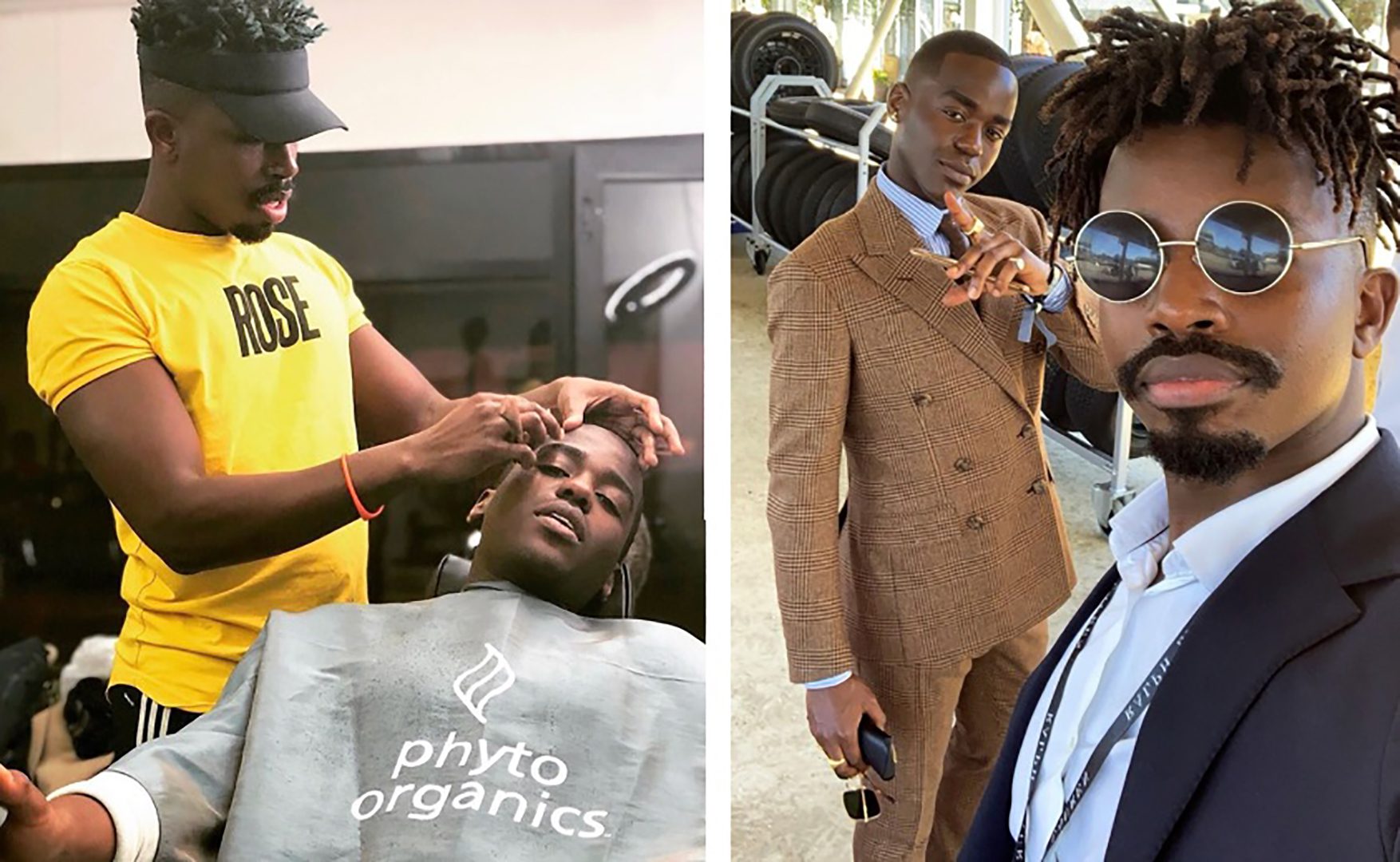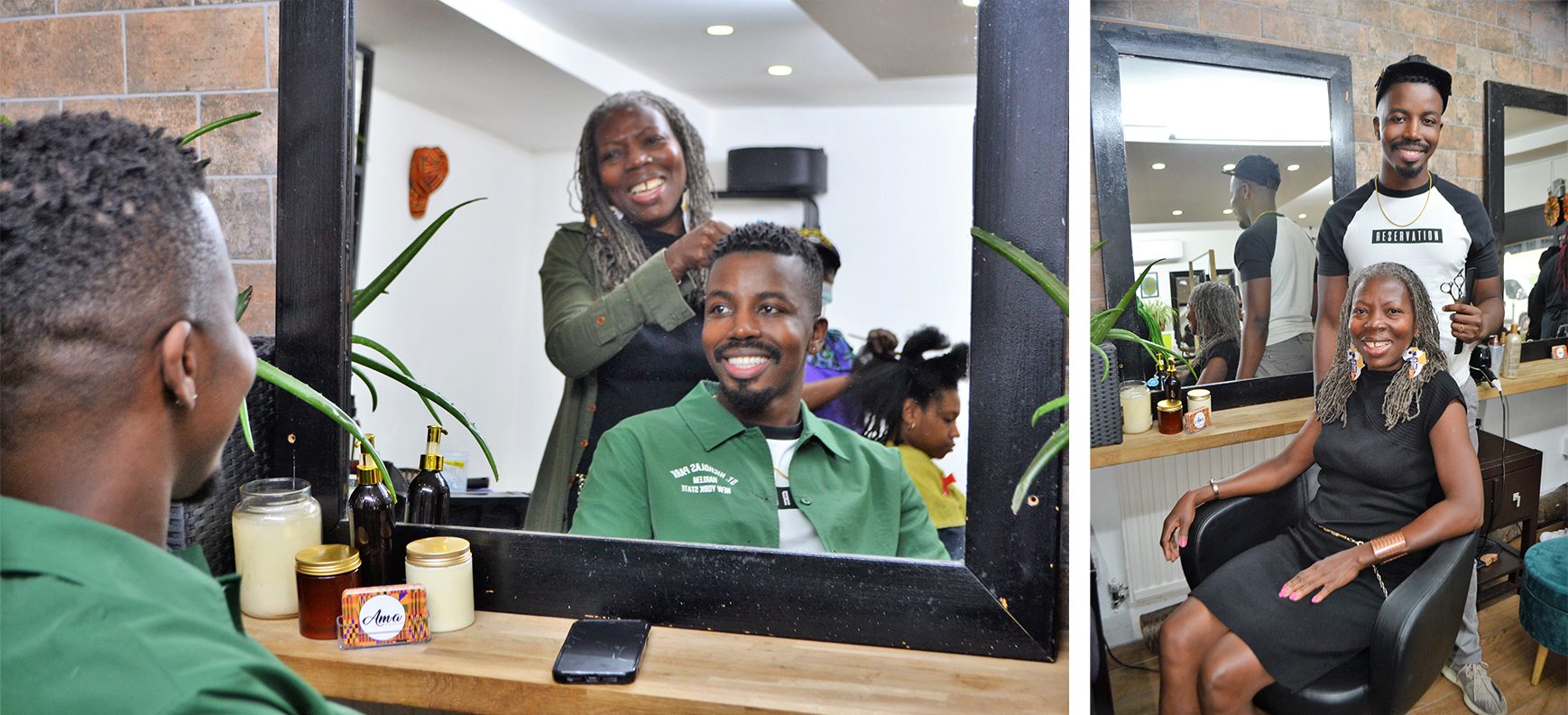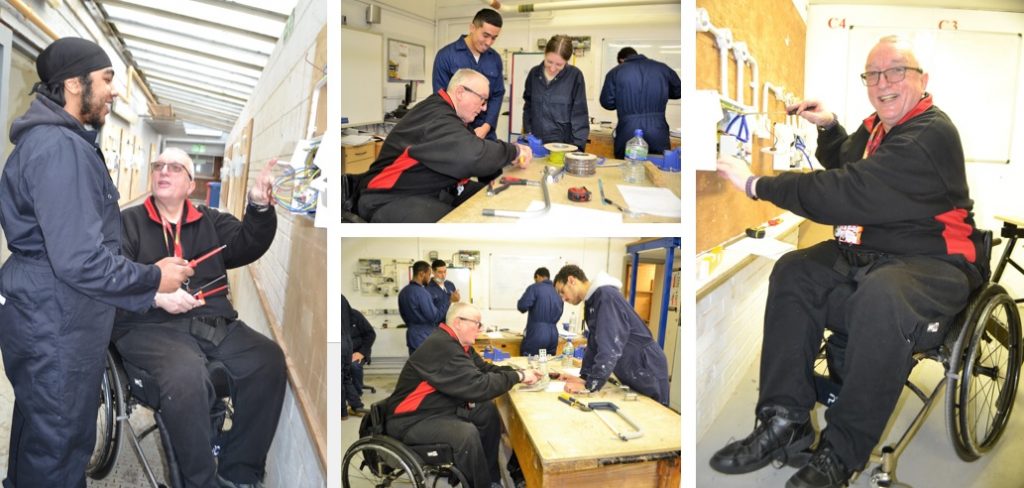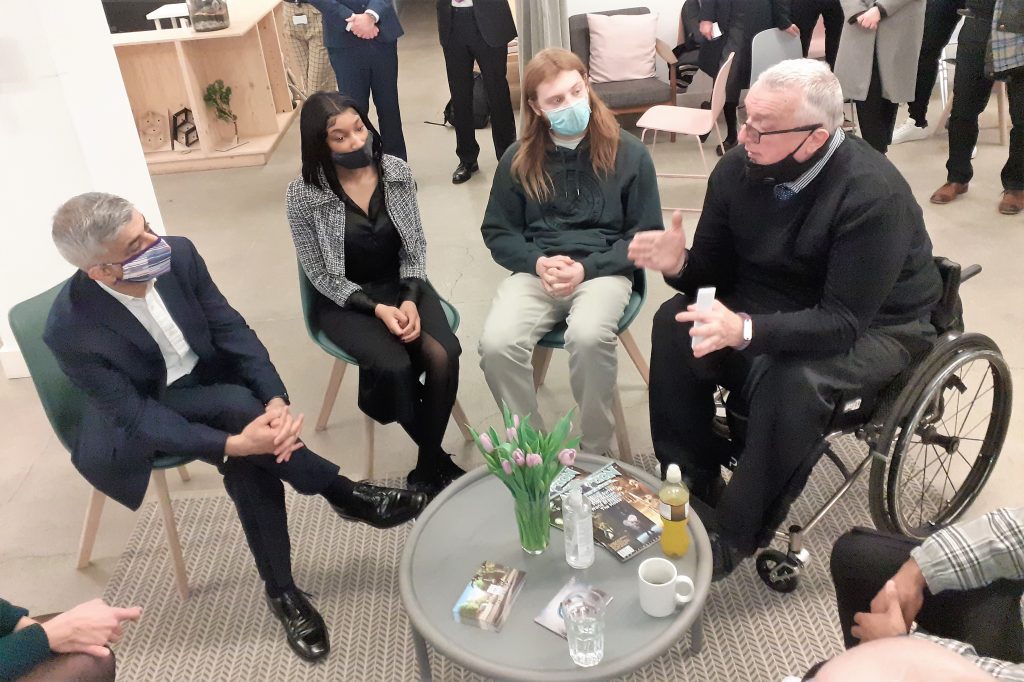Tag: North East
A former hairdressing student at the College of Haringey, Enfield and North East London (CONEL) has recalled how cutting the new Doctor Whos’ hair led him to work in TV.
Rwandan-born Ncuti Gatwa, 29, was unveiled as the new Time Lord on 8 May and is also set to appear in a Barbie film out next year starring Margot Robbie and Ryan Gosling.
Silas Baiden, 36, cut Ncuti’s hair for the Netflix hit series Sex Education, six years after the pair had become friends when Silas was working for a BT call centre in Scotland.
Silas runs Ama Hair Salon in south Tottenham, which specialises in Afro-Caribbean hair, with his mum Ama who also trained at CONEL and started the business in 2001.
He said: “Ncuti is one of my best friends. We met at a party in Glasgow and I cut his hair when he moved to London and lived with me and my mum for a couple of years.
“When he got a part in Sex Education, he told me that they were looking for a barber. I was fresh out of college at the time and didn’t feel ready to work on a production, but I nervously went to the set, made some connections and they gave me the job.
“I remember having a bit of imposter syndrome, like I’m not supposed to, or don’t deserve to be here, but now I feel I’ve reached another level. In addition to barbering, I can do braids, cornrows and locks, which are still quite niche things in the TV industry.”

Silas also cut and styled hair on set and at the salon for other cast members including Asa Butterfield, Kedar Williams-Stirling, George Robinson, Chinenye Ezeudu, Jonny Amies and Olive Gray.
Silas has gone on to work on Halo, a TV series based on the video game of the same name, for Paramount+ as well as The Mosquito Coast for Apple TV+.
His other famous clients include actors Yasmin Finney, Clifford Samuels, Morgan Rees, Ariyon Bakare and Karla Chrome and singer Henry Dell.
Ama, 57, came to the UK from Ghana in 1990 with Silas when he was just four years old and initially struggled to find work.
She said: “I used to have my own boutique business in Ghana, so being unemployed was foreign to me. The only job I could get was in catering, but that wasn’t my passion.
“I did my own hair and my grandma’s and some friends back home. I always enjoyed the social aspect of the job and making people feel and look good.”
Ama enrolled on a hairdressing course at CONEL, then the College of North East London, in 1992, and worked in a couple of salons in Tottenham before opening her own.
“The teachers showed us how to become fully fledged hairdressers and made us believe in ourselves. They were very experienced and pushed us to be the best we could be,” she said.
“I did placements at Afro and European salons to gain experience with both textures. They didn’t train in Afro hair at the college at the time, but that has changed now, which is good to see.”
Ama has long been an advocate of natural hair, particularly among the Afro-Caribbean community, and has encouraged her clients not to use relaxers or other chemical treatments.
“The death of George Floyd in America and Black Lives Matter has given black people more confidence to be themselves because it is out there that we’re treated differently,” she said.
“We’ve woken up to accept who we are. I see it in young people and I tell them how lucky they are to be free to wear their hair the way they want to.”

When Silas was younger, he would often help his mum out washing clients’ hair at weekend to earn extra pocket money during which time he learnt to plait and blow dry.
“I’ve always unofficially been an employee of my mum. I used to watch the way she and the rest of her staff would transform people in a few hours and create some magic,” he said.
“Working with my mum is awesome. I’m proud that I’ve been able to continue the business and raise the salon’s profile with new ideas and clientele and put it on the map.”
Ama added: “Silas has made so many wonderful changes to the business and we have been able to grow and increase our turnover. We’re now busier than ever.”
You might not end up cutting Doctor Who’s hair or working for Netflix but now is the right time for you to start your career in hairdressing or barbering with CONEL.
With top-quality training salons in our Tottenham and Enfield sites and excellent tuition to help you gain a recognised qualification, a career in this rewarding industry is within your reach.
Apply now for our Hairdressing and Beauty Therapy courses.
John Poulter was paralysed in a work accident and spent 14 years in recovery. Here he tells his inspiring story about how the College of Haringey, Enfield and North East London (CONEL) gave him the chance to train as an electrician and run his own business.
John Poulter was 42 when his life changed forever.
The father of three was paralysed from the waist down when a forklift driver dropped a heavy pallet on his lower back when he was working as an HGV driver in August 2007.
John said: “I was dropping off a delivery. The forklift driver came out and the first two pallets came off without a problem. He then got a call on his mobile and while he was talking, he hit the tilt button and my life as I knew it ended.”
John’s recovery took 14 years, and he is now an electrician with his own business after training at the College of Haringey, Enfield and North East London (CONEL).
Prior to the accident, John, now 56, had worked as a butcher and served in the British Army in the Falklands, Northern Ireland, Germany, Korea and the first Gulf War.
He was by his own definition “a man mountain” who would spend every spare moment when he was not working at the gym.

He said: “I had heavy muscle build and was still disciplined after coming out of the Army and wanted to develop myself. At weekends I was weight training and free running up and down hills with air cylinders and kegs to build up my cardio and breaking all my personal bests.”
John was airlifted to the Royal Surrey County Hospital and then transferred to the Royal London Hospital where he underwent two operations and then to a spinal unit at Stoke Mandeville Hospital in Buckinghamshire over the next four weeks.
He then spent the next 18 months at the Royal National Orthopaedic Hospital in Stanmore and over the following 12 years continued to undergo surgery and rehabilitation at Stoke Mandeville.
“Those were the darkest days of my life,” said John.
“I was very angry and the most bitter, twisted individual you could come across. When I first got a wheelchair, I kept asking myself why am I sitting in it, why am I going through this, why me?”
John married his wife Adrienne a year before leaving the Army. They had two sons Craig and Perry and a daughter Becky who were teenagers at the time of the accident.
“I think the impact on them was more than it was on me,” he said.
“My wife has stuck by me through thick and thin. She was hard as nails and straight-faced on the outside but broken on the inside. She never let her appearance show her weakness and that’s what kept me going.”
Medical and psychiatric teams at Stoke Mandeville helped John to overcome his negativity and supported him throughout his recovery.
“My psychotherapist reprogrammed my way of thinking. It took two to three months to trust her and from there we moved forward all the time. Everything in my brain was saying what can I do? I had so much energy but nowhere to divert it,” he said.

In 2015, while John was living and still undergoing therapy in Buckinghamshire, his doctors asked him what he wanted to do next and suggested he go to college.
He began applying for electrical courses and was turned down by 44 colleges across the UK before being accepted and offered a place at CONEL.
He said: “I kept get red flagged all the time, college after college. Then CONEL took me on the assumption if I prove I can do it, they will put the building blocks in place for me. I told them if you tell or show me something, I’ll soak it up like a sponge and will achieve good results.”
John moved to Tottenham and went on to complete two Electrical Installations diplomas with Distinction at CONEL and became an advocate for diversity and inclusion at the college.
It was something of a homecoming for John who was born and grew up in nearby Enfield.
John said: “I can’t fault anything about CONEL. If it wasn’t for the college, I wouldn’t have moved forward. Everyone at CONEL treated me with dignity and has got my respect for the simple reason they opened one door, and every door after that has followed.”
Towards the end of his time at CONEL John launched his own business, JRP Electrical. He is currently studying for a Level 4 electrical qualification while also giving his time to help and inspire the next generation of electricians at the college.
He runs his business with Adrienne and son Perry, providing the tendering, design and contracting of electrical works for domestic and large developments. When visiting sites he uses ramps, chairlifts, cherry pickers and creepers to aid his mobility.
Earlier this year John met Mayor of London Sadiq Khan at the launch of the Mayor’s Academies Programme, a £44 million investment to provide free skills training to get people into work and boost the capital’s recovery from the COVID pandemic.
CONEL secured £250,000 to run a Green Academy Hub that is working with employers to create training opportunities in the construction and green industries.
“The only person that can tell an individual they can’t do something, is themselves,” he said.
“I don’t admit failure, I never have done. I’ve always given everything 100 per cent commitment and looked at my results and thought can I do better.
“You can and will overcome the challenges you will face. Keep pushing because you will get there in the end. Your best days are not behind you, they are yet to come.”
Find out more about our Construction courses and apprenticeships.













